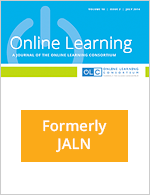Assessing Teacher Presence in a Computer Conferencing Context
This paper presents a tool developed for the purpose of assessing teaching presence in online courses that make use of computer conferencing, and preliminary results from the use of this tool. The method of analysis is based on Garrison, Anderson, and Archer's [1] model of critical thinking and practical inquiry...

